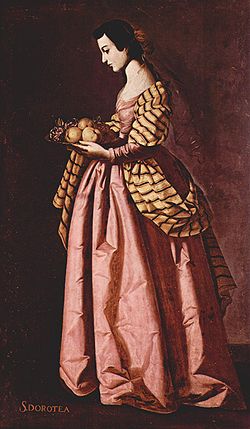- Dorothea of Caesarea
-
Saint Dorothy of Caesarea 
Saint Dorothy, Francisco de ZurbaránDied ~311
Caesarea MazacaHonored in Roman Catholic Church; Eastern Orthodox Church Feast February 6 Attributes maiden carrying a basket of fruit and flowers, especially roses; also depicted wearing a crown of flowers (such as roses); depicted surrounded by stars as she kneels before the executioner; crowned with palm and flower basket, surrounded by stars; depicted in an orchard with the Christ-child in an apple tree; leading the Christ-child by the hand; veiled with flowers in her lap; depicted holding apples from heaven on a branch[1] Patronage horticulture; brewers; brides; florists; gardeners; midwives; newlyweds; Pescia[1] Saint Dorothy (Dorothea, Dora; Italian: Santa Dorotea, Spanish: Santa Dorotea; died ca. 311) is a 4th century virgin martyr who was executed at Caesarea Mazaca. Evidence for her actual historical existence or acta is very sparse. She is called a martyr of the Diocletianic Persecution, although her death occurred after the resignation of Diocletian himself. She should not be confused with another 4th century saint, Dorothea of Alexandria.
She and Theophilus are mentioned in the Roman Martyrology as martyrs of Caesarea in Cappadocia, with a feast day on 6 February.[2] She is thus officially recognized as a saint, but because there is scarcely any non-legendary knowledge about her, she is no longer (since 1969) included in the General Roman Calendar.
Contents
Veneration
The earliest record that mentions Dorothea is found in the Martyrologium Hieronymianum. This first record contains only three basic facts: the day of martyrdom, the place where it occurred, and her name and that of Theophilus.[3]
Dorothy's cult became widespread in Europe during the Middle Ages.[4] She was venerated in Europe from the seventh century.[5] In late medieval Sweden she was considered as the 15th member of the Fourteen Holy Helpers,[4] and in art she occurred with Saint Barbara, Catherine of Alexandria and Margaret of Antioch, forming with them a quartet of female saints called Huvudjungfrur meaning "The Main Virgins."
Dorothy of Caesarea's life and martyrdom was the basis of Philip Massinger and Thomas Dekker's The Virgin Martyr (printed 1622).
The Congregation of the Sisters of Saint Dorothy is a convent of active nuns, occupied primarily with teaching and the cultivation of flowers and produce. The order is named for Dorothea of Caesarea.
-
Saint Dorothy and the Angel by Alessandro Tiarini
She was born during the time of the Christian persecutions. Saint Dorothy hated worshiping idols so the count told her father, her mother, and her two sisters, Christine and Celestine, to forsake their possessions, and so they did, and fled into the realm Cappadocia, and came into the city of Caesarea where they sent Saint Dorothy to school. Soon after she was christened of the holy bishop by Saint Appollinarius, he named her Dorothy, and she was filled with the Holy Ghost, and with great beauty above all the maidens of that realm.
See also
- Sainte-Dorothée, Quebec, a borough in Laval, Quebec, Canada
References
- ^ a b Patron Saints Index: Saint Dorothy of Caesarea
- ^ Martyrologium Romanum (Libreria Editrice Vaticana 2001 ISBN 88-209-7210-7)
- ^ Joseph Martin Peterson, The Dorothea Legend: Its Earliest Records, Middle English Versions, and Influence of Massinger’s "Virgin Martyr" (University of Heidelberg, 1910), 13.
- ^ a b Santa Dorotea e Teofilo
- ^ Catholic Encyclopedia: St. Dorothea
References
- Butler, Alban. The Lives of the Saints. Rockford, Illinois: Tan Books and Publishers, 1995. (Originally published 1878.) Nihil obstat and Imprimatur 1955.
- Englebert, Omer. The Lives of the Saints. Christopher and Anne Fremantle, trans. New York: Barnes & Noble Books, 1994. Nihil obstat and Imprimatur 1951.
- Harvey, Sir Paul, ed. The Oxford Companion to English Literature. 4th ed. New York: Oxford University Press, 1967.
- Peterson, Joseph Martin, The Dorothea Legend: Its Earliest Records, Middle English Versions, and Influence of Massinger’s "Virgin Martyr" (University of Heidelberg, 1910).
- The Swedish Nationalecyklopedin Volume 5 p. 102
- Medeltidens ABC edited by The Swedish national museum of history p. 93, 276.
External links
- (Italian) Santa Dorotea e Teofilo Martire di Cesarea di Cappadocia
- Representetions of Saint Dorothea of Caesarea
- St. Dorothy page at the Christian Iconography web site
Categories:- 311 deaths
- Anatolian Roman Catholic saints
- Saints from Anatolia
- 4th-century Christian martyr saints
- 4th-century Romans
- 4th-century Christian female saints
Wikimedia Foundation. 2010.



